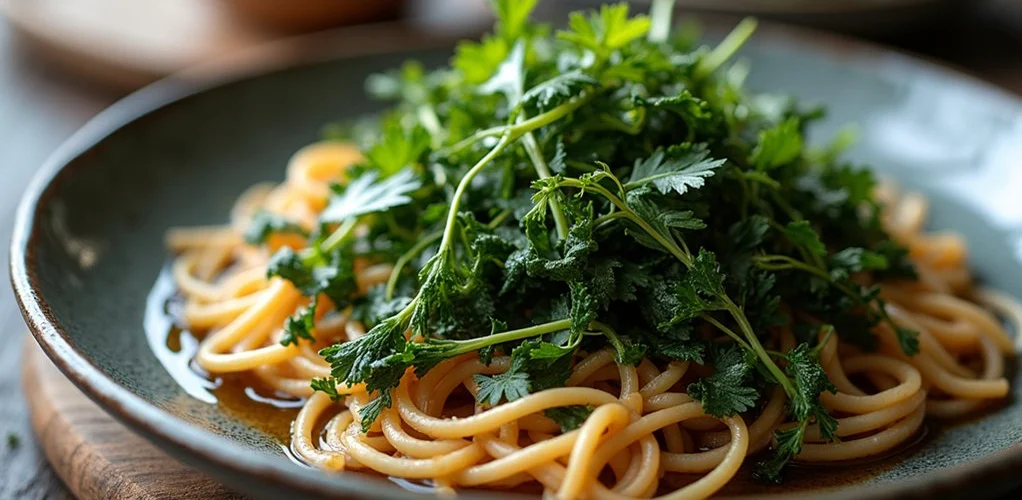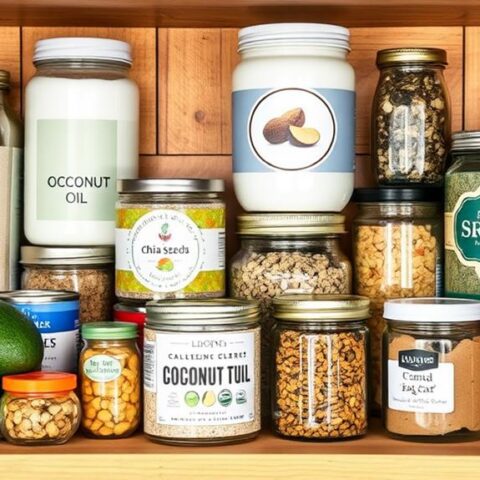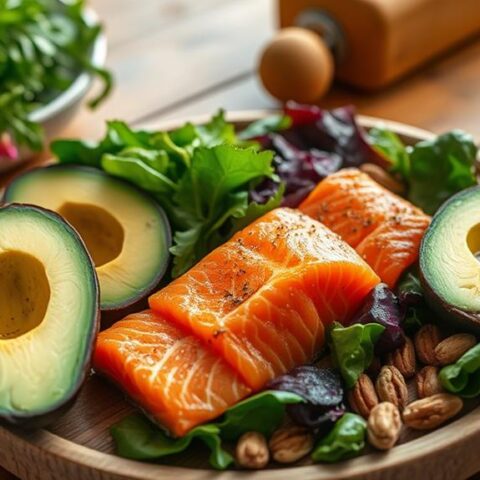
Seaweed is indeed a low-carb food, containing only 0.83 grams of net carbs per 2-tablespoon serving with a glycemic index of 4. Common varieties like nori, kelp, and wakame all maintain minimal carbohydrate content while providing essential nutrients including calcium, iron, and magnesium. This sea vegetable fits well into ketogenic and low-carb dietary protocols, offering versatile preparation options from sushi rolls to salads. Understanding seaweed's complete nutritional profile reveals even more benefits for health-conscious consumers.
Key Takeaways
- Seaweed is exceptionally low-carb, containing only 0.83 grams of net carbs per 2 tablespoons serving.
- Most seaweed varieties, including nori, kelp, and dulse, contain less than 4 grams of net carbs per serving.
- With a glycemic index of 4, seaweed helps maintain stable blood sugar levels while providing essential nutrients.
- Seaweed offers significant nutritional benefits like vitamins and minerals without adding substantial carbohydrates to your diet.
- Seaweed can be incorporated into keto-friendly meals through sushi rolls, salads, and snacks while maintaining low-carb goals.
Understanding Seaweed's Carbohydrate Profile
When examining seaweed's nutritional composition, its carbohydrate profile stands out as remarkably favorable for those following low-carb dietary protocols. With just 0.83 grams of net carbs per 2 tablespoons, seaweed offers a minimal impact on daily carbohydrate intake while delivering essential nutrients.
The carbohydrate content in seaweed varieties, including nori, kelp, and dulse, maintains a consistently low glycemic index of 4, making it an excellent choice for maintaining stable blood sugar levels.
This oceanic vegetable provides valuable dietary fiber while keeping total carbs significantly low, allowing for versatile incorporation into ketogenic meal plans. Its unique nutritional composition, combining minimal carbohydrates with beneficial minerals and vitamins, positions seaweed as an ideal ingredient for those seeking to enhance their low-carb dietary choices.
Types of Seaweed and Their Net Carb Content
Different varieties of seaweed offer distinct carbohydrate profiles, with each type containing varying amounts of net carbs that can fit into low-carb eating plans.
Nori stands out as particularly keto-friendly with less than 1 gram of net carbs per sheet, while kelp and dulse contain slightly higher amounts at 3.6 and 2.7 grams of net carbs per serving, respectively.
Wakame provides another excellent option for low-carb diets, containing just 0.83 grams of net carbs per serving, making most seaweed varieties suitable choices for carb-conscious individuals.
Popular Seaweed Varieties Explained
Seaweed varieties offer remarkably low carb counts across their diverse range, making them excellent additions to ketogenic and low-carb dietary plans.
Nori, the familiar wrap used in sushi rolls, contains less than 1 gram of net carbs per sheet, while kelp provides just 3.6 grams per 100-gram serving.
For those seeking variety in their low-carb diet, dulse presents an appealing option with only 2.7 grams of net carbs per 10-gram portion.
Wakame, commonly featured in Asian cuisine, contains a mere 0.83 grams of net carbs per 2 tablespoons, demonstrating the versatility of seaweed in keto-friendly meal planning.
These nutritious sea vegetables consistently maintain minimal carbohydrate content while delivering essential minerals and vitamins, positioning them as practical choices for carb-conscious consumers.
Net Carb Breakdown Analysis
A thorough analysis of net carb content reveals distinct variations among popular seaweed varieties, offering valuable insights for those monitoring their carbohydrate intake. When examining different types of seaweed for low carb and ketogenic diets, the numbers demonstrate their suitability for carb-conscious eating plans.
| Seaweed Type | Net Carbs per Serving |
|---|---|
| Nori | <1g per sheet |
| Kelp | 3.6g per 100g |
| Dulse | 2.7g per 10g |
With an average net carb content of just 0.83 grams per 2 tablespoons, seaweed proves to be a highly compatible option for those following ketogenic diets. The minimal impact on blood sugar levels makes these sea vegetables an excellent choice, while their rich nutritional profile adds significant value to a low-carb eating plan.
Seaweed's Essential Nutrients and Minerals
Nutritional powerhouses of the sea deliver an impressive array of essential minerals and vitamins that support overall health and wellness.
Seaweed provides significant amounts of calcium, iron, and magnesium, with a 2-tablespoon serving containing 16.8mg, 0.285mg, and 12.1mg respectively. These marine vegetables are also rich in vitamins C, A, E, and K, contributing to various bodily functions.
Beyond minerals and vitamins, seaweed contains beneficial amino acids and dietary fiber, offering 0.13g per serving to aid digestion and promote feelings of fullness.
Its low glycemic index of 4 makes it an excellent choice for maintaining stable blood sugar levels. This combination of nutrients positions seaweed as a valuable addition to health-conscious diets, providing extensive nutritional benefits in a concentrated form.
How Seaweed Fits Into Low-Carb Diets
Seaweed varieties like nori, kelp, and dulse contain minimal net carbs, ranging from 0.5 to 1.5 grams per serving, making them excellent additions to ketogenic and low-carb eating plans. The abundant minerals and vitamins in seaweed, including iodine, iron, and B vitamins, support overall health while maintaining strict carbohydrate limits required for these diets. These versatile sea vegetables can enhance meals through simple additions to salads, soups, or as standalone snacks, offering both nutritional benefits and satisfying texture without compromising carbohydrate restrictions. Incorporating seaweed can complement other keto-friendly foods like fish, meat, and nuts, ensuring a balanced and nutrient-rich diet.
Carb Content By Type
Understanding the carb content of different seaweed varieties proves crucial for those following low-carb dietary plans. With just 0.83 grams of net carbs per 2 tablespoons, seaweed generally aligns well with low-carb diets while providing essential vitamins and minerals.
Different seaweed types offer varying carbohydrate profiles. Nori stands out as particularly low-carb, containing less than 1 gram of net carbs per sheet. Kelp presents a moderate option with 3.6 grams of net carbs per 100 grams, while eelgrass contains a higher 8.27 grams per 100 grams, making it less suitable for strict carb restriction.
Significantly, seaweed's low glycemic index of 4 guarantees minimal blood sugar impact, supporting stable energy levels throughout the day.
Health Benefits Worth Noting
While maintaining a low-carb lifestyle, incorporating seaweed offers substantial health benefits beyond its minimal carbohydrate content. Its rich nutritional profile supports overall wellness while adhering to dietary restrictions, making it an excellent addition to low-carb meal plans.
| Health Benefit | Impact on Low-Carb Diet |
|---|---|
| Blood Sugar Control | GI of 4 maintains stable energy levels |
| Nutrient Density | High in vitamins and minerals without carb load |
| Weight Management | Fiber promotes satiety and portion control |
The combination of essential vitamins, minerals, and antioxidants in seaweed provides extensive health support without compromising carbohydrate limits. Its anti-inflammatory properties and diverse nutrient profile make it particularly valuable for those seeking to optimize their nutrition while following a low-carb eating pattern.
Easy Meal Integration Tips
Countless creative options exist for incorporating seaweed into a low-carb eating plan, making it an adaptable and practical dietary addition.
With its impressive nutrient profile and minimal carbohydrate content, seaweed offers versatile meal integration possibilities while maintaining dietary goals.
- Create keto-friendly sushi rolls using nori sheets as wrappers for vegetables and proteins.
- Crumble dried seaweed over salads for added crunch and mineral-rich flavor enhancement.
- Incorporate kelp or dulse into homemade broths and soups for depth and nutrition.
- Enjoy plain dried seaweed as a satisfying low in carbs snack between meals.
The natural versatility of seaweed allows for seamless incorporation into various dishes, making it an excellent choice for those seeking to maintain their low-carb lifestyle while exploring new flavors and textures.
Health Benefits of Including Seaweed in Your Diet
Beyond its minimal carbohydrate content, seaweed offers an impressive array of health benefits that make it a valuable addition to any diet. The combination of being low in net carbs and rich in essential minerals makes seaweed particularly beneficial for health-conscious individuals.
Its abundant calcium, iron, and magnesium content supports bone health, oxygen transport, and muscle function, respectively.
Seaweed's nutritional profile extends to its impressive vitamin content, featuring vitamins C, A, E, and K, which collectively enhance immune function and maintain skin health.
The presence of antioxidants and anti-inflammatory compounds provides protection against cellular damage, while its low glycemic index of 4 helps maintain stable blood sugar levels.
These characteristics make seaweed especially valuable for individuals managing their blood glucose or following low-carb dietary protocols.
Best Ways to Enjoy Seaweed While Limiting Carbs
Health-conscious individuals seeking to limit their carb intake can create satisfying seaweed wraps by using nori sheets as an alternative to traditional tortillas or bread.
Seaweed salads offer another excellent low-carb option, combining different varieties of seaweed with keto-friendly ingredients like sesame oil, cucumber, and avocado.
These versatile dishes can be prepared quickly at home or found in many Asian restaurants, making them convenient choices for maintaining ketogenic dietary goals while experiencing diverse flavors and textures.
Quick Seaweed Wraps
Many low-carb enthusiasts have discovered that seaweed wraps offer an excellent alternative to traditional bread-based sandwiches, with nori sheets containing less than one gram of net carbs per serving.
These versatile wraps align perfectly with a keto diet while providing essential nutrients and minerals.
Creating quick seaweed wraps is straightforward and allows for endless low-carb combinations.
Here's what makes them an ideal choice:
- Nori sheets provide a sturdy base with minimal carbohydrates
- Each wrap contains beneficial nutrients, including iodine and antioxidants
- The preparation process requires no cooking or special equipment
- Fillings can include keto-friendly options like avocado and cream cheese
The simplicity of assembly, combined with the nutritional benefits, makes seaweed wraps an excellent addition to any low-carb meal plan.
Keto-Friendly Seaweed Salads
While traditional seaweed salads often contain hidden sugars and carbs, creating keto-friendly versions at home offers a delicious way to enjoy these nutrient-rich dishes without compromising a low-carb lifestyle.
A typical seaweed salad serving contains merely 0.83 grams of net carbs per 2 tablespoons, making it an excellent choice for those monitoring their carbohydrate intake.
Home preparation allows for careful selection of complementary ingredients that maintain ketogenic requirements while enhancing flavor.
Combining wakame or nori with sesame oil, tamari, and avocado creates a satisfying dish rich in essential nutrients like Vitamin K, calcium, and iron.
The fiber content promotes satiety, while the minimal net carbs, less than 1 gram per serving, guarantee these oceanic greens remain a sustainable addition to any low-carb eating plan.
Shopping Guide: Finding Low-Carb Seaweed Products
Finding low-carb seaweed products requires knowledge of specific varieties and careful label reading to guarantee the best options for a carbohydrate-restricted diet. When shopping for seaweed products, consumers should focus on varieties like nori, kelp, and dulse, which contain minimal net carbs and fit well within restricted eating plans.
- Check nutritional labels for net carb content, aiming for products with less than 3g per 100g serving.
- Seek out plain, unsweetened varieties without added sugars or high-carb seasonings.
- Explore Asian grocery stores and health food shops for diverse, quality selections.
- Consider online retailers for access to a broader range of low-carb seaweed options.
Both local stores and online marketplaces offer numerous options for those seeking low-carb seaweed products, making it convenient to incorporate these nutritious foods into a carbohydrate-conscious lifestyle.
Incorporating Seaweed Into Your Meal Planning
Integrating seaweed into a low-carb meal plan offers both nutritional benefits and culinary versatility without compromising carbohydrate restrictions. With its remarkably low carb content of 0.83 grams per serving, seaweed provides essential minerals while supporting steady blood sugar levels.
| Meal Type | Seaweed Option | Benefits |
|---|---|---|
| Breakfast | Nori Wraps | High calcium, low-carb |
| Lunch | Wakame Salad | Rich in magnesium |
| Dinner | Kelp Noodles | Iron-fortified |
| Snacks | Dried Seaweed | Convenient, crunchy |
Potential Side Effects and Considerations
Though seaweed offers numerous nutritional benefits in a low-carb diet, consumers should be mindful of potential health considerations before adding it to their meal plans.
Seaweed can be a valuable addition to low-carb diets, but its consumption requires careful consideration of potential health impacts.
While generally safe for consumption, certain risks require careful attention, particularly for individuals with specific health conditions or sensitivities.
- Excessive seaweed intake can result in iodine overload, potentially disrupting thyroid function.
- Some people may experience allergic reactions, including digestive issues or skin reactions.
- Seaweed can contain heavy metals absorbed from marine environments, making source verification essential.
- Those with pre-existing thyroid conditions should consult healthcare providers before regular consumption.
Additionally, the restrictive nature of the keto diet can lead to nutrient deficiencies, so it's important to balance seaweed intake with other nutrient-rich foods.
These considerations don't necessarily mean avoiding seaweed altogether, but rather approaching its consumption thoughtfully and in moderation while being mindful of individual health circumstances and sourcing from reputable suppliers.
Research-Backed Evidence on Seaweed and Blood Sugar
Scientific research consistently demonstrates seaweed's favorable impact on blood sugar management, with its remarkably low glycemic index of 4 making it an excellent choice for those monitoring their glucose levels.
The minimal net carb content of just 0.83 grams per 2 tablespoons aligns perfectly with low-carb dietary requirements.
Studies support seaweed's role in blood sugar control, attributing its effectiveness to its extensive nutritional profile that includes dietary fiber, antioxidants, and anti-inflammatory compounds.
The fiber content not only contributes to its low net carb count but also promotes a feeling of fullness.
Additionally, research indicates that seaweed's bioactive compounds work synergistically to support metabolic health, making it a valuable addition to blood sugar management strategies.
Frequently Asked Questions
Can I Eat Seaweed on a Low-Carb Diet?
Seaweed varieties fit perfectly into low-carb diets, offering nutritional benefits with minimal carbohydrates. Various seaweed types can enhance low carb recipes while providing essential minerals and vitamins.
Why Is It Not Good to Eat Seaweed Everyday?
Daily seaweed consumption poses health risks through excessive iodine levels, potential heavy metal accumulation, and digestive issues. It may also disrupt nutritional balance when replacing diverse vegetable intake.
Does Eating Seaweed Lower Blood Sugar?
Research indicates seaweed's dietary fiber and bioactive compounds support blood sugar regulation. Its polysaccharides and alginate content improve insulin sensitivity, while fiber content helps maintain stable blood sugar levels naturally.
Are There Carbs in Seaweed?
Seaweed contains minimal carbohydrates, with approximately 0.83g net carbs per 2 tablespoons. Different seaweed varieties maintain low nutritional content of carbs while offering significant health benefits through essential minerals and fiber.
Conclusion
Seaweed represents an excellent addition to low-carb diets, offering minimal net carbohydrates while providing essential nutrients and minerals. With proper selection and portion control, various types of seaweed can enhance meal plans without compromising ketosis or blood sugar management. As research continues to support its health benefits, incorporating seaweed into a balanced diet remains a smart choice for those seeking nutritious, low-carb alternatives in their wellness journey.










No Comments